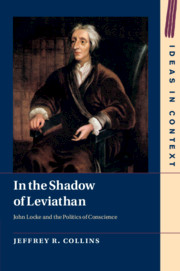Book contents
- In the Shadow of Leviathan
- Ideas in Context
- In the Shadow of Leviathan
- Copyright page
- Dedication
- Contents
- Acknowledgements
- Note on the Text
- Abbreviations
- Introduction
- Chapter 1 John Locke and Interregnum Hobbism
- Chapter 2 The Restoration Projects of Thomas Hobbes
- Chapter 3 Locke and the Restoration Politique
- Chapter 4 Non-domination Liberty in Spiritual Context
- Chapter 5 Locke, Conscience, and the Libertas Ecclesiae
- Chapter 6 Locke and Catholicism
- Chapter 7 Locke and a ‘More Liberal’ Hobbism
- Conclusion
- Bibliography
- Index
- Ideas In Context
Chapter 6 - Locke and Catholicism
The ‘Roman Leviathan’
Published online by Cambridge University Press: 07 February 2020
- In the Shadow of Leviathan
- Ideas in Context
- In the Shadow of Leviathan
- Copyright page
- Dedication
- Contents
- Acknowledgements
- Note on the Text
- Abbreviations
- Introduction
- Chapter 1 John Locke and Interregnum Hobbism
- Chapter 2 The Restoration Projects of Thomas Hobbes
- Chapter 3 Locke and the Restoration Politique
- Chapter 4 Non-domination Liberty in Spiritual Context
- Chapter 5 Locke, Conscience, and the Libertas Ecclesiae
- Chapter 6 Locke and Catholicism
- Chapter 7 Locke and a ‘More Liberal’ Hobbism
- Conclusion
- Bibliography
- Index
- Ideas In Context
Summary
Chapter 6 examines the particular question of John Locke’s position on the toleration of Catholics. This, the chapter argues, was the major area in which his views did not significantly evolve. Recent scholars have tried to establish that Locke softened his position on the intolerability of Catholics by appealing to a ‘loyalist’, oath-taking minority tradition within the Catholic chapter. This chapter refutes this claim and demonstrates Locke’s lifelong refusal to countenance such Gallican (or, in the English context, ‘Blackloist’) solutions to the Catholic question. When these views of Locke are set in their full context, they emerge as another variation on his rejection of the ‘Hobbesian politique’. Loyalist Catholics after the civil war were strongly influenced by the sovereignty theory of Hobbes and on that basis appealed for toleration as an act of monarchical prerogative. Locke’s hardening opposition to such forms of indulgence alienated him from such strategies. Catholics, he came to believe, were irretrievably dominated by either the papacy or the state and thus could not appeal for religious freedom as an inalienable right.
Keywords
- Type
- Chapter
- Information
- In the Shadow of LeviathanJohn Locke and the Politics of Conscience, pp. 271 - 314Publisher: Cambridge University PressPrint publication year: 2020
- 1
- Cited by

